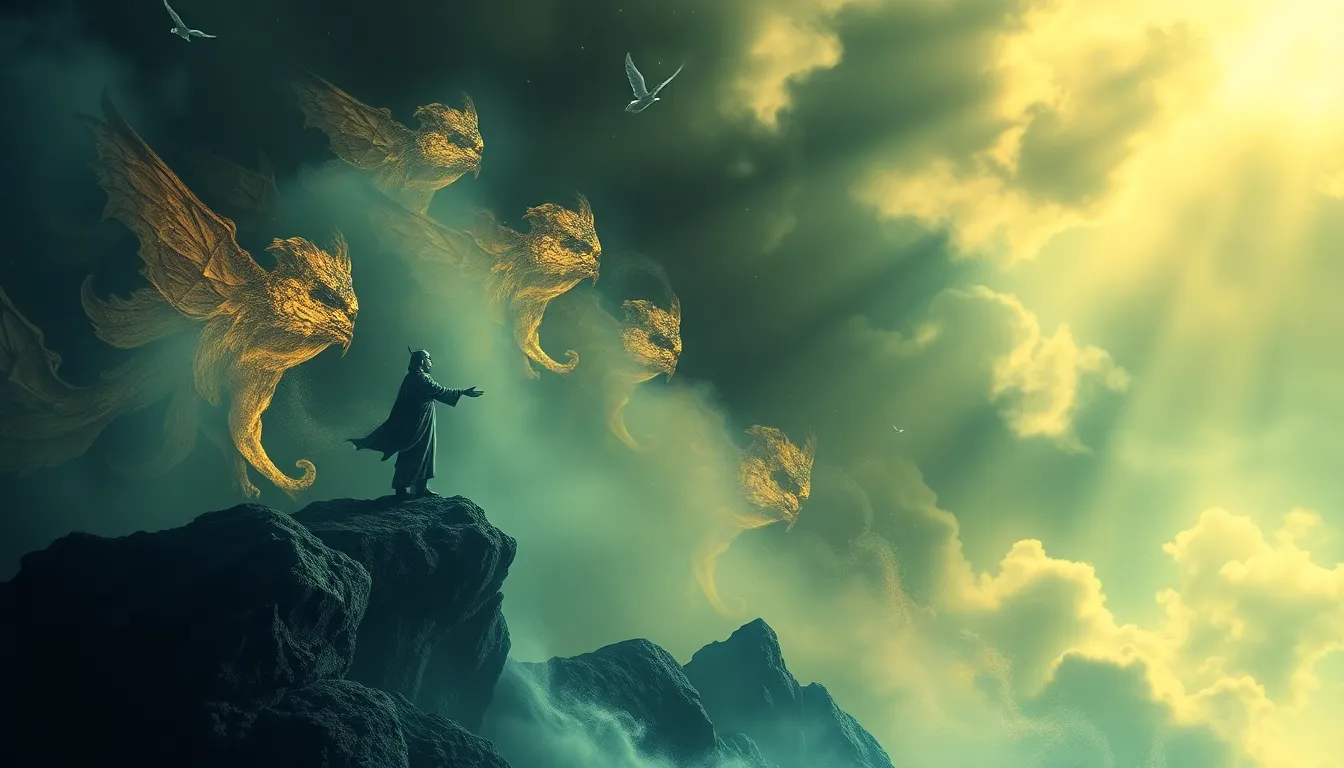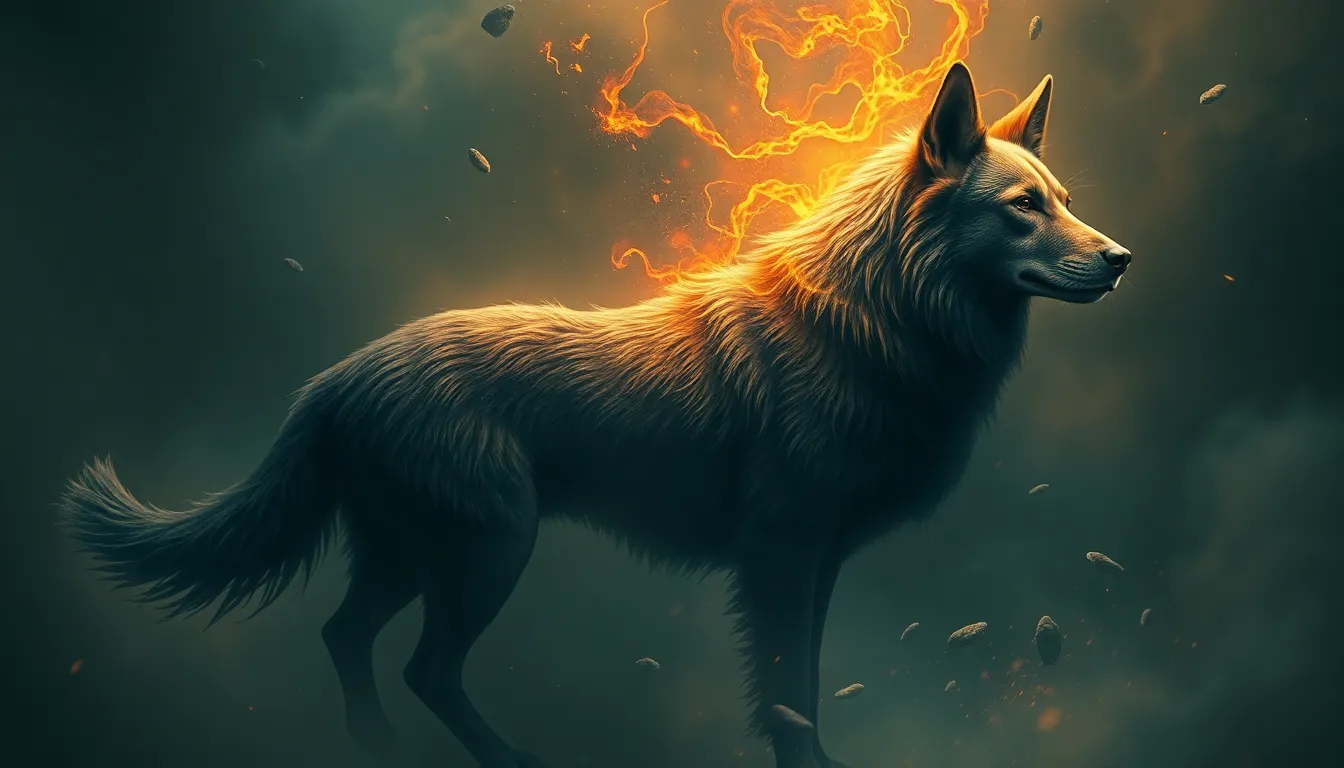From Fear to Freedom: Transformative Journeys in Mythology
I. Introduction
Transformative journeys in mythology are narratives that explore the evolution of characters as they confront and overcome significant challenges, often catalyzed by an initial fear. These journeys serve not only to entertain but also to impart essential truths about human nature and personal growth.
Fear is a prevalent theme in mythological narratives, acting as both a barrier and a motivating force that drives characters toward transformation. This article will delve into the intricate relationship between fear and liberation, examining how mythological journeys reflect our own struggles for freedom and self-discovery.
II. The Nature of Fear in Mythology
Mythology frequently depicts a variety of fears that resonate with human experiences. Some common fears depicted include:
- Death: The ultimate unknown, representing the end of existence.
- The unknown: Fear of what lies beyond familiar boundaries.
- Loss: The anxiety surrounding separation from loved ones or one’s identity.
These fears have deep psychological implications, often reflecting the internal struggles of individuals. In mythological contexts, fear acts as a catalyst for transformation, pushing characters out of their comfort zones and compelling them to confront their limitations.
III. Heroic Archetypes and the Call to Adventure
Joseph Campbell’s concept of the hero’s journey, or monomyth, encapsulates the common stages that heroes undergo in myths. This journey begins with a call to adventure, which often invokes fear of change and uncertainty.
Numerous mythological heroes face their fears head-on. For instance:
- Odysseus: Confronts numerous fears during his journey home, including the wrath of gods and the challenge of the unknown seas.
- Perseus: Faces his fear of Medusa, transforming through his confrontation with her into a hero of great renown.
These heroes exemplify the courage required to embark on transformative journeys, illustrating that fear can serve as a powerful motivator for growth and change.
IV. Trials and Tribulations: The Path to Self-Discovery
The trials faced by heroes in mythology are significant milestones in their journeys. These challenges not only test their resolve but also lead to profound self-discovery and transformation.
Overcoming obstacles often reveals the latent potential within the hero, with fear acting as a catalyst for growth. Consider the following case studies:
- The Labors of Heracles: Each labor represents a fearsome challenge that, once overcome, leads to Heracles’ ultimate redemption and recognition.
- The Trials of Psyche: Psyche’s journey through trials imposed by Venus highlights the transformative power of love and perseverance in overcoming fear.
These myths illustrate that trials are crucial for personal development and highlight the theme of transformation through adversity.
V. The Role of Mentors and Guides
Mentorship plays a vital role in helping heroes navigate their fears and challenges. Mentor figures often provide the wisdom and guidance necessary for transformative journeys.
Archetypal mentor figures in mythology include:
- Merlin: Guides King Arthur in his quest for greatness.
- Gandalf: A modern interpretation of the mentor archetype in J.R.R. Tolkien’s works, guiding Frodo through his fears in “The Lord of the Rings.”
These mentors facilitate transformative journeys by instilling confidence and offering critical insights, showcasing the importance of guidance in overcoming fear and achieving freedom.
VI. Symbolism of Transformation: From Fear to Freedom
Mythological narratives often employ powerful symbols of transformation, such as metamorphosis and rebirth. These symbols signify the journey from fear to freedom, illustrating the potential for change inherent in all individuals.
Common symbols of transformation include:
- The Phoenix: Represents rebirth from ashes, symbolizing renewal after trials.
- Metamorphosis: The transformation of characters, like that of Kafka’s Gregor Samsa, reflects profound changes and new beginnings.
Specific myths highlight this transformation, such as the story of Demeter and Persephone, which embodies the cyclical nature of life and the transformation of fear (loss) into acceptance and freedom.
VII. Cultural Perspectives on Transformation
Across various cultural mythologies, transformative journeys share common themes, yet they also exhibit unique interpretations of fear and freedom. A comparison of different mythologies reveals interesting insights:
- Greek Mythology: Focuses on the hero’s personal struggle and the consequences of hubris.
- Norse Mythology: Emphasizes fate, with characters facing inevitable doom yet striving for valor.
- African Mythology: Often highlights communal aspects of transformation, with stories reflecting the importance of community and connection.
These diverse interpretations offer valuable lessons on the nature of fear and the paths to liberation, enriching our understanding of the human experience.
VIII. Modern Interpretations and Adaptations
Mythological journeys continue to resonate in contemporary literature and media, reflecting ancient themes of fear and transformation. Modern storytelling often draws from these narratives to explore complex human emotions.
Examples of modern adaptations include:
- Films: “The Lion King” mirrors the hero’s journey, focusing on Simba’s fear and eventual embrace of his identity.
- Books: “Harry Potter” series reflects the hero’s journey, with themes of fear, loss, and the quest for identity.
- Art: Contemporary artists often explore mythological themes, depicting transformation and fear in innovative ways.
These modern interpretations highlight the enduring relevance of mythological journeys, demonstrating their power to inspire and resonate across generations.
IX. Psychological and Philosophical Insights
Mythological narratives offer profound psychological insights into the human condition. They explore the impact of fear on individuals, illustrating how confronting these fears can lead to personal growth and liberation.
Philosophically, these narratives invite reflections on the nature of fear and freedom in the human experience. They suggest that:
- Fear can be a teacher, guiding individuals toward self-discovery.
- Transformation is often a painful yet necessary process for achieving freedom.
- Embracing one’s fears can lead to a more authentic and fulfilling life.
In conclusion, the transformative journeys depicted in mythology offer rich insights into the interplay between fear and freedom. Through the exploration of heroic archetypes, trials, mentorship, and cultural perspectives, we uncover timeless lessons that continue to resonate in our modern lives.


